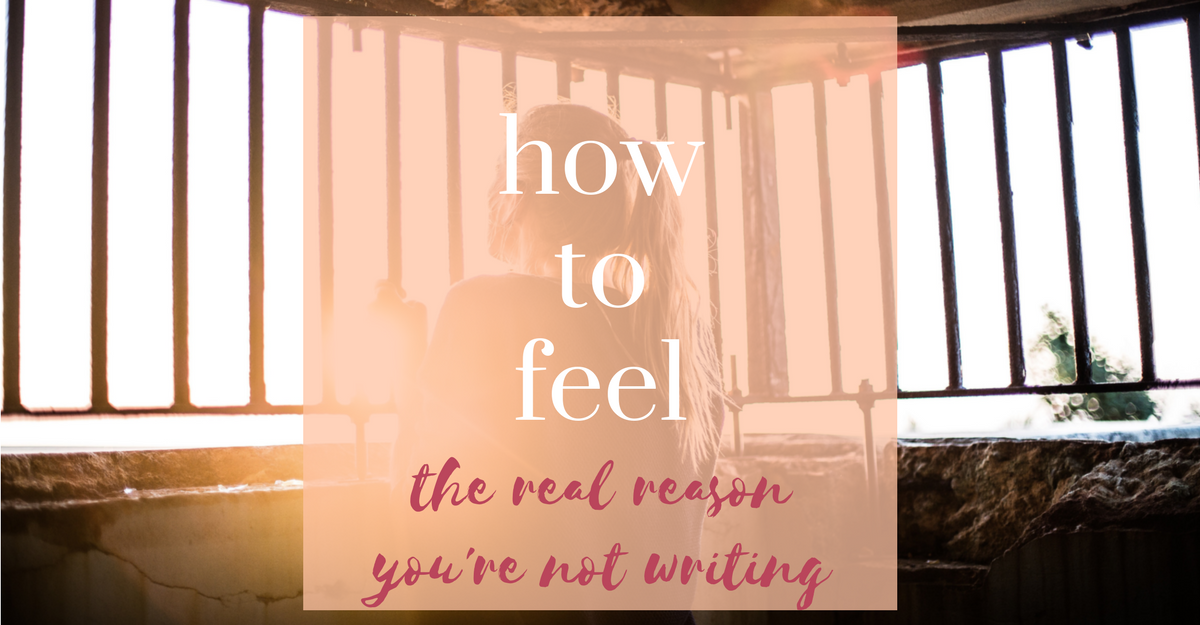My story: How I went from “always wanting to write” to actually writing
/I’ve alluded to my story many times in these posts.
I’ve danced around my story. Told you bits and bobs, dribs and drabs. Some of them quite personal, or painful. I’m a private person, so I wonder every day whether I should say so much about myself. But I’ve learned so much from other bloggers and writers who’ve opened up about their journeys, and my mission here is to go deep and to be honest.
So now I think it’s time to sketch out my story—or at least the arc of it—in one place.
The truth
Here’s the truth: three years ago, I nearly gave up on my longtime dream of being a writer. I was tired and worn-down and uninspired, and I’d put off writing—writing seriously—for the better part twenty years. Besides, there were so many other claims on my time and energy and attention: my job as a scientific recruiter, my three-hour commute (round trip, thank goodness), the tides and waves and rocks of my relationship with my longtime partner, and the glossy, espresso-stained floors of our apartment, which despite my best efforts never looked truly clean.
At the time, I thought I had it pretty rough, but the truth is that things only got worse. These past three years have been the hardest of my life, hands down. But during that time, I’ve developed a regular writing practice. I’ve gotten serious about it. Heck, I even quit my job to write. (Which is just about the craziest thing I’ve ever heard.)
Yes, I still feel like a fraud. I still suffer from perfectionism and jealousy and anxiety and plain old procrastination. I still struggle to show up to the page most days. So I’m not sharing my story because I’m some perfect writer who lights a stick of incense each morning and lets the words, I don’t know, flow out of me.
I’m sharing my story because—despite significant setbacks and sorrows in my personal life, despite a mental disposition that makes me want to throw in the towel whenever things don’t go my way—I’ve managed to establish a serious writing practice. And by setting pen to paper, I’ve found solace and insight and healing and strength.
The big woods
Let’s back up a bit. And by “a bit,” I mean a couple of decades.
Little Laura
When I was seven, I got the flu. Fever, chills, sheets stuck to my skin with sweat. And then I got it again. Bad. For days I lay in my new canopy bed, staring at the floral-printed fabric above me. The roses seemed to shimmer and move.
Finally, the fever broke and I was able to sit up. To eat. And—to my delight—to read. My mom had just bought me a box set of Laura Ingalls Wilder books, and—propped up by a sea of pillows, a little ceramic bell by my side in case I needed something and was too hoarse to call out—I cracked the spine of Little House in the Big Woods. (I cracked the spine of every book I ever had. I wasn’t a gentle kid.)
I loved it. The world, the characters, the oddly specific descriptions of how Pa made bullets and preserved deer meat. As I lay under my rose-patterned canopy, devouring page after page even after my mom turned off my light and told me to rest, I decided: when I grew up, I was going to be a writer.
For the rest of my childhood, my heroes—heroines, rather—were fictional writers. Anne Shirley. Jo March. Emily Starr. Rebecca of Sunnybrook Farm. "Girls who write stories,” as Perri Klass called them.
When I was a kid, my love for writing was sweet and easy and uncomplicated. In the second grade, I wrote a story called King the Horse, which borrowed rather heavily from Fantastic Mr. Fox. In the third grade, I wrote an essay about how, if I were president of the United States, I’d invent windshields that corrected people’s vision impairments. In the fourth grade, I wrote a poem about a tea set that got into a fairly rollicking fight.
I scribbled, I rhymed, I wrote for the joy of it. And whenever anyone asked what I wanted to be when I grew up, my answer was at the ready: a writer.
Sure, I sometimes thought my writing could be better, and I felt bad for stealing from Roald Dahl, but I didn’t suffer from perfectionism. I didn’t worry that I’d never finish anything, or amount to anything, or be as successful as my peers.
Those fears came during high school.
Old scars
High school wasn’t a good time for me, and a lot of that had to do with food. I vacillated between dieting and bingeing—between limiting my diet to fat-free cheese and stuffing myself with an entire tin of Christmas cookies that weren’t even mine. I drank liter after liter of Crystal Light in an effort to feel full. And, to put it mildly, that all sucked.
We roll our eyes at high-school hardships, don’t we? But maybe we shouldn’t. Maybe we shouldn’t dismiss them as trivial. Because as I watched the scale go down twenty pounds and then up forty-five, as I watched myself become powerless over my food intake, as I watched myself sneak chips and cereal and cookies when I was already painfully full, I lost confidence: in my self-discipline, in my competence, in my ability to stick to anything. My ability to see things through.
And all of this affected my writing. I started to question every word I wrote. Was it too pretentious? Or too silly? Would it be obvious to anyone who read my stories that I’d never kissed a boy, that I couldn’t stick to a diet, that I was fat and ugly?
I stopped finishing my stories. I ripped pages out of my notebooks and stuffed them deep in the trash, beneath dirty tissues and banana peels. Just throwing them away wasn’t enough.
In high school, I still told people that I wanted to be a writer. But my confidence—my hope that I’d actually manage it—was draining out of me.
Maybe it seems silly to you that I’m going on about my experiences as a kid and adolescent. Just get to the part where you start writing professionally, you might be thinking. Or at least the part where you cancel the wedding.
But here’s my advice: If you’re struggling with creativity or productivity or delivering on your dreams, look at your old scars. When did you begin thinking you were lazy, or unproductive, or less talented than everyone else? When did you begin to wonder if life was conspiring to keep you from writing, or painting, or playing the piano? Remember: Somewhere along the way, you started believing these things. That doesn’t make them true.
The domed ceiling
My happy place: the English Department library at my college.
For me, college was a breath of fresh air. I found myself surrounded by people who loved ideas and words and the claustrophobic, damp-paper smell of the library’s windowless stacks. I dreamed again. I imagined living in a tiny apartment in Paris, or Prague, and writing my brains out.
My first winter, I wanted to take a fiction-writing course, but only poetry was offered. So I nestled into an armchair in a small classroom that looked like a two hundred-year-old parlor: marble fireplace, fearsome portraits of men with cravats, hand-drawn wallpaper, and—oddest of all—a domed ceiling that warped the room’s acoustics, making someone in the furthest corner sound as if she was whispering in your ear.
On the first day of class, the professor—a thin-boned woman with an explosion of gray curls and the sharpest blue eyes I’d ever seen—perched in her own armchair and said, “The ceiling in here collapsed a few years ago, you know. I’m hoping they got it right this time.”
My classmates and I glanced up nervously.
That professor—Cleopatra Mathis—changed the course of my writing life. She forced me to approach poetry as a discipline, a devotion. She taught me that Latinate words feel flowery and Anglo-Saxon words pack a punch. She edited the heck out of my poems and showed me that good writing needs a turn, a hinge, a moment of change or surprise or revelation.
And she liberated me to write about myself. I’d always worried that I wouldn’t be interesting to other people. But Cleopatra saw past my hunched posture, my lumpy sweaters, my jeans that were two sizes too big.
“Sometimes,” she told me, “I think there’s so much going on in that head of yours that your hair’s about to catch fire.”
I took that as a compliment.
Junior year, I finally enrolled in that fiction-writing course. My dad had been diagnosed with leukemia, and I was in a fragile space—homesick, anxious, not sleeping. And my fiction professor saw no potential in me at all.
One afternoon, we sat in his wood-paneled office, going through my stories, dissecting all the ways they were tired and contrived and different from Raymond Carver’s.
“It’s funny,” the professor said, “because in workshop, your suggestions for your classmates’ stories are quite good. You’re stronger as an editor than as a writer.”
Like many aspiring writers—like many 21-year-olds—I was at the mercy of other people’s opinions. In her firm, forceful way, Cleopatra encouraged me, so I stuck with poetry throughout college and for several years afterward. But because of my fiction professor’s feedback, I gave up on writing stories for years and years—and decided to become an editor at a publishing house.
By the time I graduated from college, my dream had shifted. “I’d like to work in publishing,” I told people, “but someday I’d like to write.”
That’s enough for one day, isn’t it? Stay tuned for Part Two of my story, where you’ll find out just how close I came to giving up and how I found my way back to a regular writing practice. And yes, I’ll tell you about how I quit my job.
So, friends. What old scars that keep you from your creative work? Are there any past criticisms—like my fiction professor’s feedback—that you carry with you?











